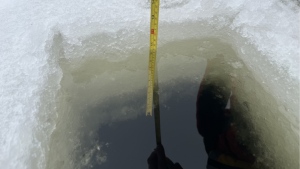As winter temperatures continue to rise, the safety of skating on icy lakes is becoming a growing concern. Warmer winters are creating potentially unstable and unsafe conditions for those who enjoy skating on frozen bodies of water.
According to experts, the increase in average global temperatures is causing ice to form later in the season and melt earlier, resulting in thinner and weaker ice. This is especially concerning for those who live in colder regions where skating on frozen lakes is a popular winter activity.
In addition to thinner ice, warmer temperatures also lead to more unpredictable weather patterns, making it difficult to determine when it is safe to skate on a frozen lake. Sudden thaws and heavy snowfalls can further weaken the ice, creating dangerous conditions for skaters.
Furthermore, the warming of our planet is also affecting the quality of the ice itself. As temperatures rise, the ice becomes more porous, making it less dense and more prone to cracking and breaking. This can be especially hazardous for those who venture out onto the ice without proper knowledge or equipment.
Experts are urging caution and reminding people to always check the thickness and quality of the ice before skating on a frozen lake. They also recommend wearing appropriate safety gear, such as a life jacket, and never skating alone.
In addition, it is important for local authorities to regularly monitor and maintain the safety of frozen lakes for skating. This includes posting warning signs and closing off areas with thin or unstable ice.
While skating on a frozen lake can be a fun and enjoyable winter activity, it is crucial to prioritize safety and be aware of the potential risks associated with warmer winters. By staying informed and taking necessary precautions, we can continue to enjoy this beloved pastime while also staying safe.




